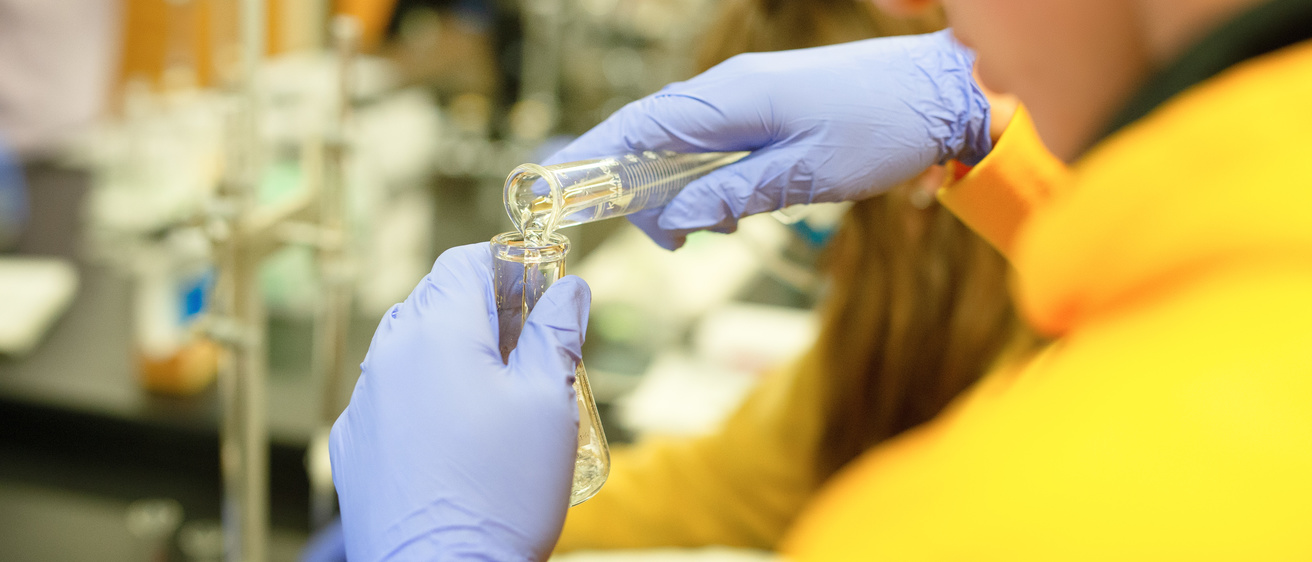Chemistry has a leading role in the technological challenges that touch all aspects of our lives. Global climate change, increasing demands on limited energy resources, the detection and treatment of human disease, concerns about environmental health, and the continuing need for new materials and synthetic strategies all demand an innovative response from chemists.
Chemistry majors gain the knowledge and skills needed to study environmental chemical pathways, produce efficient catalysts, develop new medicinal drugs, fabricate and use nanoscale materials, create new sensor technologies, identify methods for early disease diagnosis, find methods for remediation of environmental damage, and make new materials with unique properties.
The Department of Chemistry has a strong program that has been recognized in national rankings, including a recent one by the National Research Council. Departmental instructors are committed to the education of undergraduate students and have won numerous awards for outstanding teaching.
Chemistry majors are encouraged to participate in independent research with faculty members and may be a co-author of a journal article or present findings at a scientific meeting. Students also benefit from opportunities to participate in chemistry-related student organizations and living-learning communities in the residence halls.
Graduates of the Chemistry Program have been highly successful in finding jobs in business and industry, and many have entered some of the nation's best graduate and professional programs.
The department also collaborates with the UI departments of Biology, Geography, and Geoscience to offer an Environmental Sciences Program with tracks in Biosciences, Chemical Sciences, Geosciences, and Hydrosciences.
Students interested in this major need to meet the requirements for admission to the College of Liberal Arts and Sciences.
Information

First-Year

Transfer

International
Within six months of graduating, 96 percent of Iowa graduates are employed, continuing education, or not seeking work. Our Pomerantz Career Center offers multiple resources to help students find internships and jobs.
Students with a Chemistry degree can pursue careers or graduate study in a wide range of fields, such as environmental chemistry, forensic science, pharmaceutics, polymer and plastics chemistry, technical sales and writing, and education. Many go on to advanced study in the sciences or in professions such as medicine, dentistry, and law.
Learn more about career options for Chemistry majors on the American Chemical Society website.
In addition to more than 600 Student Organizations, Iowa students choose from more than 100 Study Abroad Programs and multiple Undergraduate Research Opportunities.
Student organizations of special interest to Chemistry students include the Undergraduate Chemical Society, which is affiliated with the American Chemical Society; a chapter of Alpha Chi Sigma, the professional chemistry fraternity; and Women in STEM.
The University of Iowa provides a variety of scholarships to eligible undergraduate students through the Iowa Scholarship Portal. Scholarships are available to first-year, transfer, and currently enrolled students. For additional details on scholarships for your program of study, check directly with the department or college.
The Office of Admissions and the Office of Student Financial Aid are great resources for students seeking scholarships.
Chemistry majors may earn a BA or BS degree.
The BA program is a good choice if you're interested in earning a degree in Medicine, Dentistry, Law, or another professional field after you graduate. It also is good preparation for secondary school teaching.
The BS program will prepare you for graduate study in Chemistry or related fields and for careers in business and industry. The BS degree in Chemistry is certified by the American Chemical Society.
Course requirements are similar for BA and BS students and include foundation courses in chemistry and organic chemistry, calculus, and physics. BA students take seven advanced chemistry courses. BS students take 10 advanced courses plus two additional courses that may include undergraduate research.
In addition to required coursework for the major, all students must complete the College of Liberal Arts and Science GE CLAS CORE requirements.
Most BS students in Chemistry and some BA students do undergraduate research where you'll have your own project and work closely with a faculty member. You will prepare a report on your work and have the opportunity to present your research at an undergraduate research poster session.
View Chemistry in the UI General Catalog to learn more about the Chemistry major or minor, required coursework, and graduating with honors.
Teacher Education in Chemistry
Chemistry students who plan to teach in secondary schools must complete the College of Education's Teacher Education Program. BA students who are interested in teaching may choose to enter a joint degree program and earn your BA and a Master of Arts in Teaching (MAT) in five years.
